(人教版)必修5:Unit 1 Great Scientists 过去分词作定语与表语及练习
文档属性
| 名称 | (人教版)必修5:Unit 1 Great Scientists 过去分词作定语与表语及练习 | 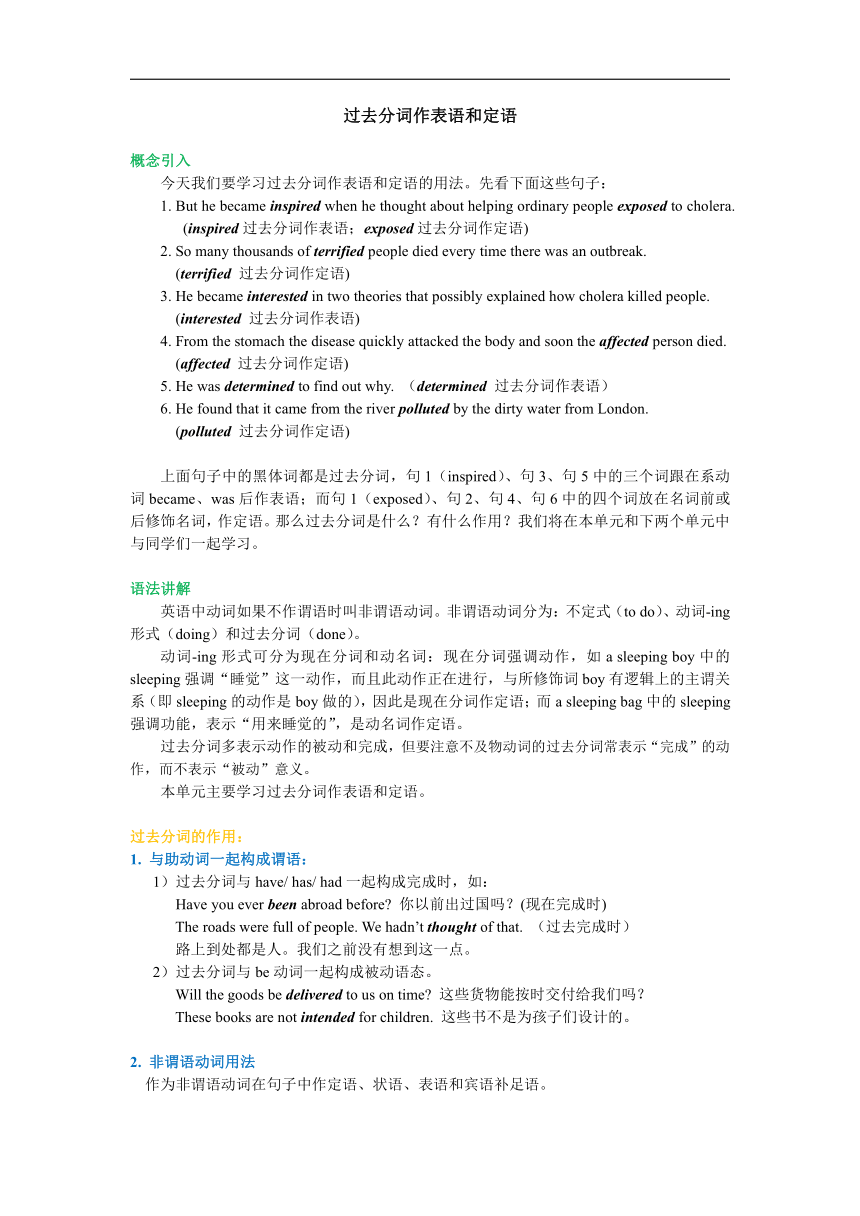 | |
| 格式 | zip | ||
| 文件大小 | 38.1KB | ||
| 资源类型 | 教案 | ||
| 版本资源 | 人教版(新课程标准) | ||
| 科目 | 英语 | ||
| 更新时间 | 2019-07-26 22:31:46 | ||
图片预览

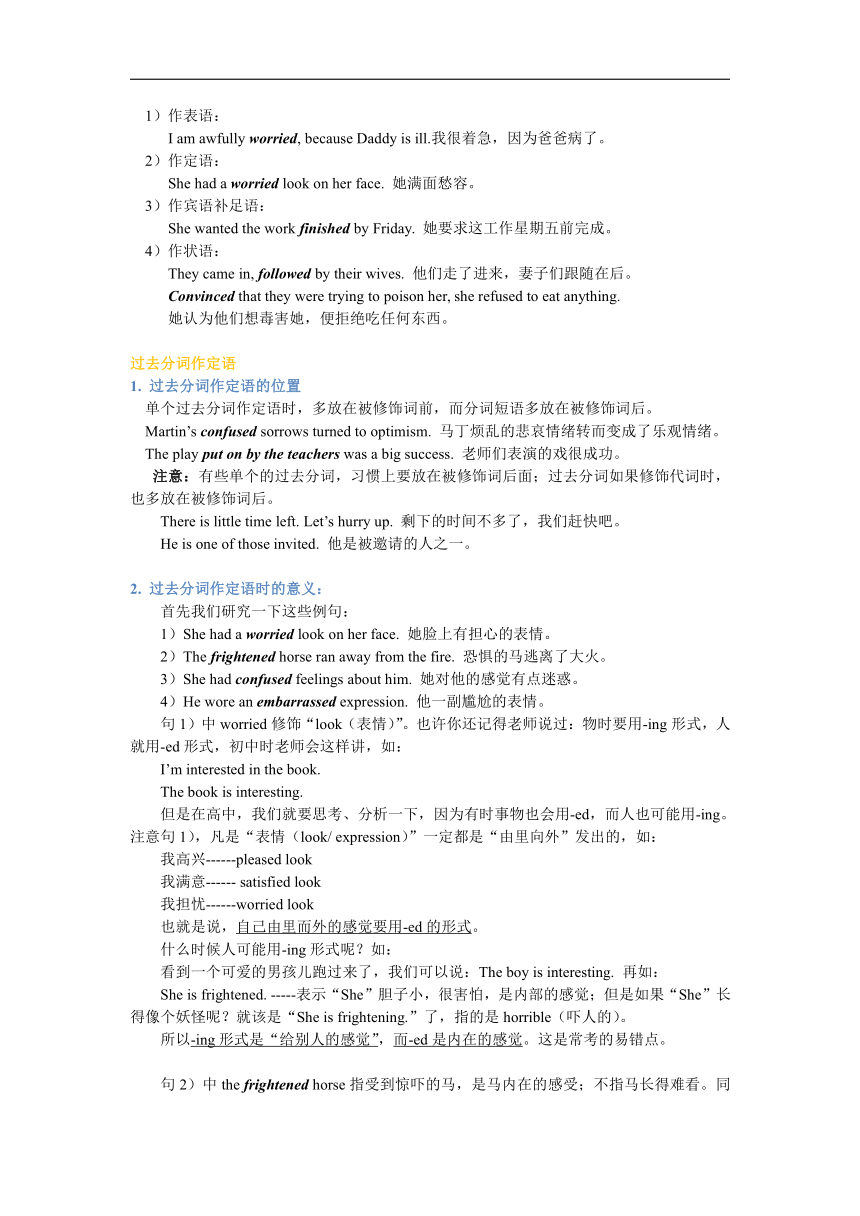
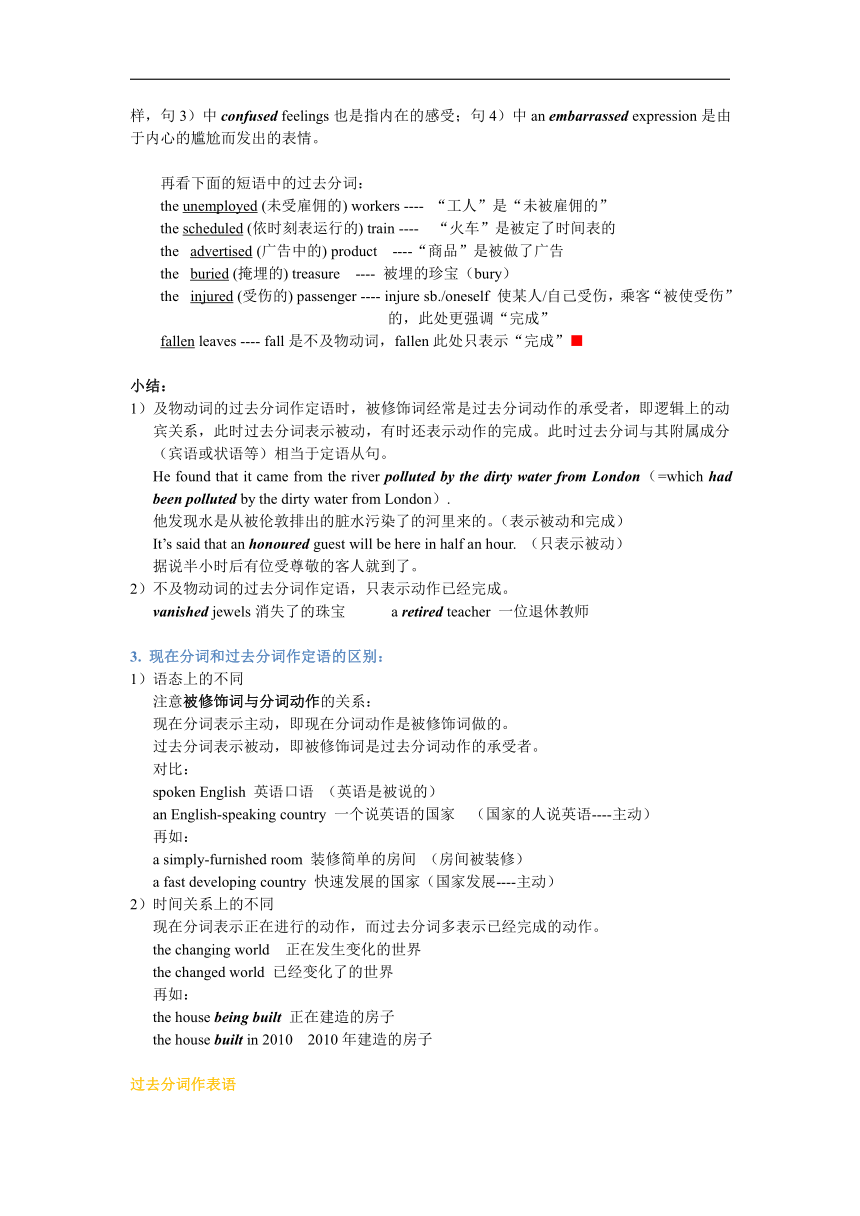
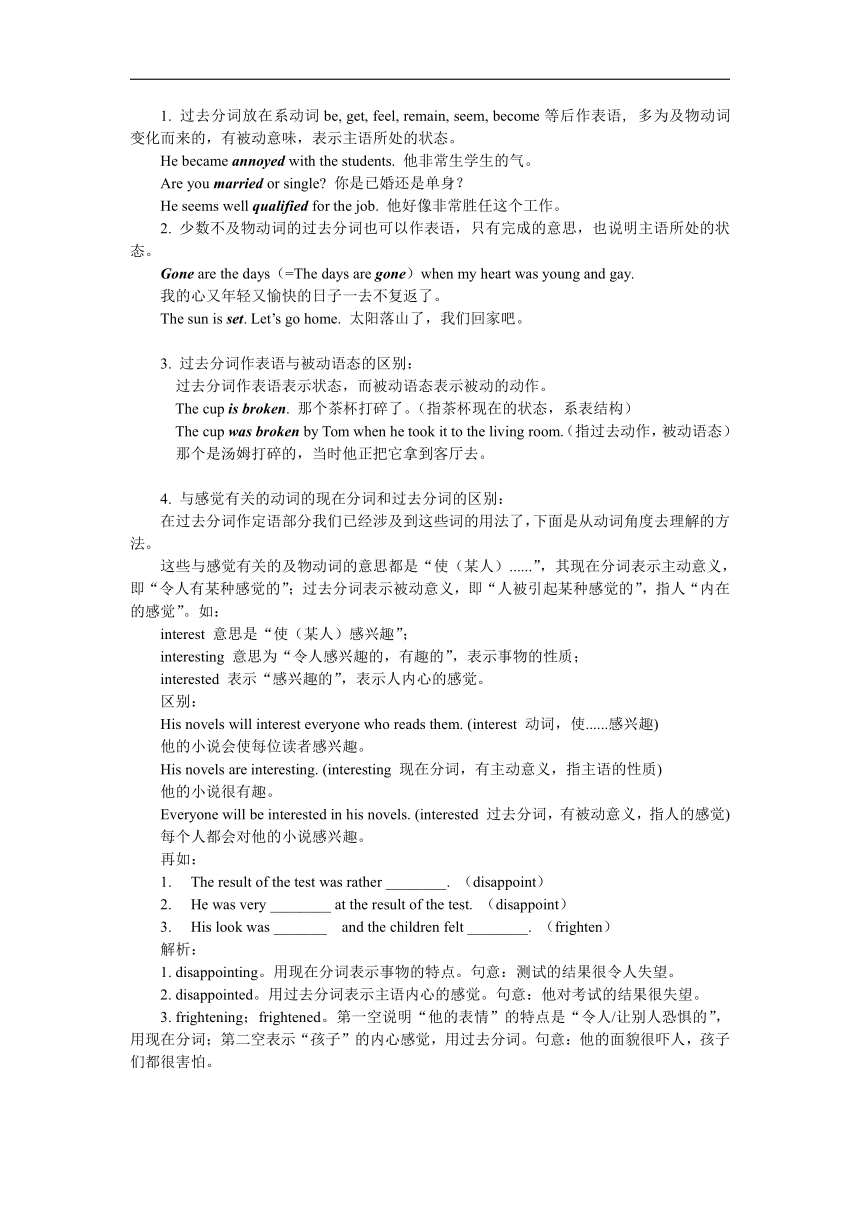
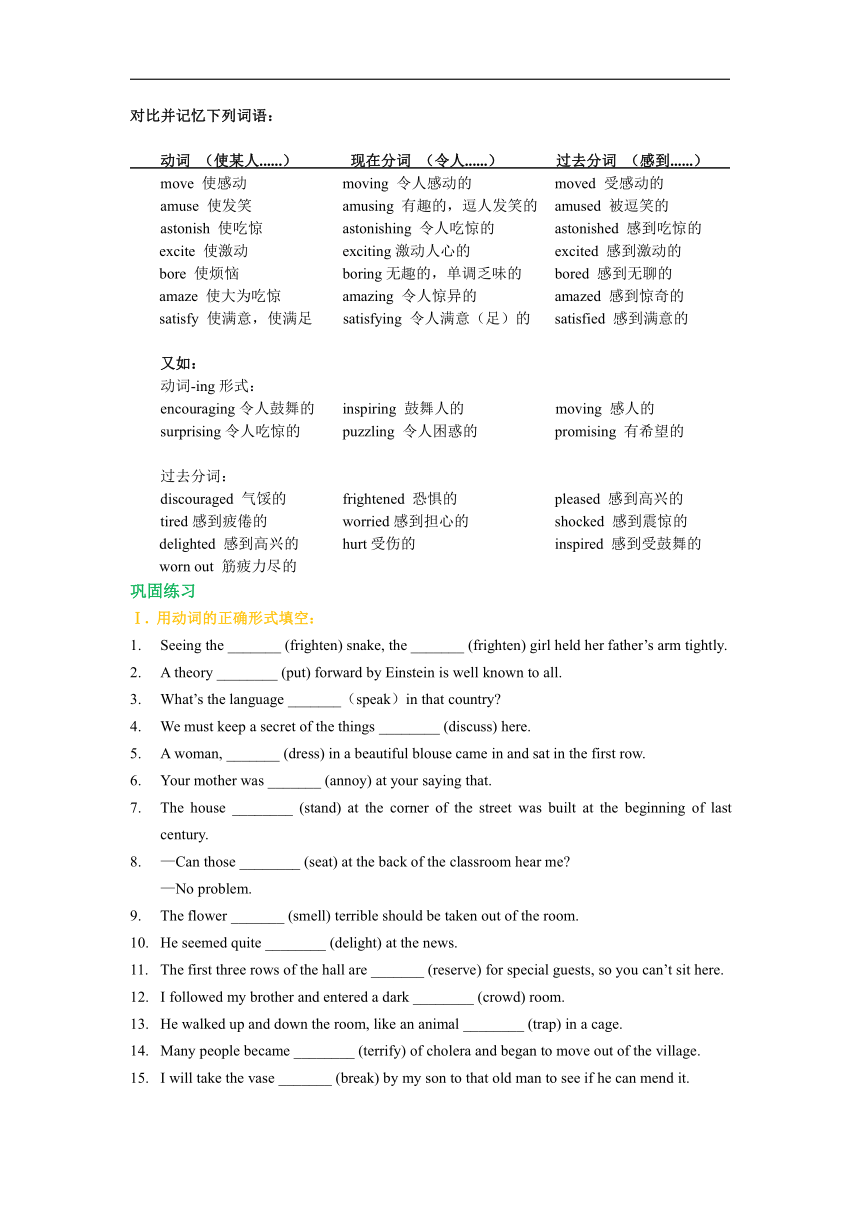
文档简介
过去分词作表语和定语
概念引入
今天我们要学习过去分词作表语和定语的用法。先看下面这些句子:
1. But he became inspired when he thought about helping ordinary people exposed to cholera. (inspired过去分词作表语;exposed过去分词作定语)
2. So many thousands of terrified people died every time there was an outbreak.
(terrified 过去分词作定语)
3. He became interested in two theories that possibly explained how cholera killed people.
(interested 过去分词作表语)
4. From the stomach the disease quickly attacked the body and soon the affected person died.
(affected 过去分词作定语)
5. He was determined to find out why. (determined 过去分词作表语)
6. He found that it came from the river polluted by the dirty water from London.
(polluted 过去分词作定语)
上面句子中的黑体词都是过去分词,句1(inspired)、句3、句5中的三个词跟在系动词became、was后作表语;而句1(exposed)、句2、句4、句6中的四个词放在名词前或后修饰名词,作定语。那么过去分词是什么?有什么作用?我们将在本单元和下两个单元中与同学们一起学习。
语法讲解
英语中动词如果不作谓语时叫非谓语动词。非谓语动词分为:不定式(to do)、动词-ing形式(doing)和过去分词(done)。
动词-ing形式可分为现在分词和动名词:现在分词强调动作,如a sleeping boy中的sleeping强调“睡觉”这一动作,而且此动作正在进行,与所修饰词boy有逻辑上的主谓关系(即sleeping的动作是boy做的),因此是现在分词作定语;而a sleeping bag中的sleeping强调功能,表示“用来睡觉的”,是动名词作定语。
过去分词多表示动作的被动和完成,但要注意不及物动词的过去分词常表示“完成”的动作,而不表示“被动”意义。
本单元主要学习过去分词作表语和定语。
过去分词的作用:
1. 与助动词一起构成谓语:
1)过去分词与have/ has/ had一起构成完成时,如:
Have?you ever been abroad before? 你以前出过国吗?(现在完成时)
The roads were full of people. We hadn’t thought of that. (过去完成时)
路上到处都是人。我们之前没有想到这一点。
2)过去分词与be动词一起构成被动语态。
Will the goods be delivered to us on time? 这些货物能按时交付给我们吗?
These books are not intended for children. 这些书不是为孩子们设计的。
2. 非谓语动词用法
作为非谓语动词在句子中作定语、状语、表语和宾语补足语。
1)作表语:
I am awfully worried, because Daddy is ill.我很着急,因为爸爸病了。
2)作定语:
She had a worried look on her face. 她满面愁容。
3)作宾语补足语:
She wanted the work finished by Friday. 她要求这工作星期五前完成。
4)作状语:
They came in, followed by their wives. 他们走了进来,妻子们跟随在后。
Convinced that they were trying to poison her, she refused to eat anything.
她认为他们想毒害她,便拒绝吃任何东西。
过去分词作定语
1. 过去分词作定语的位置
单个过去分词作定语时,多放在被修饰词前,而分词短语多放在被修饰词后。
Martin’s confused sorrows turned to optimism. 马丁烦乱的悲哀情绪转而变成了乐观情绪。
The play put on by the teachers was a big success. 老师们表演的戏很成功。
注意:有些单个的过去分词,习惯上要放在被修饰词后面;过去分词如果修饰代词时,也多放在被修饰词后。
There is little time left. Let’s hurry up. 剩下的时间不多了,我们赶快吧。
He is one of those invited. 他是被邀请的人之一。
2. 过去分词作定语时的意义:
首先我们研究一下这些例句:
1)She had a worried look on her face. 她脸上有担心的表情。
2)The frightened horse ran away from the fire. 恐惧的马逃离了大火。
3)She had confused feelings about him. 她对他的感觉有点迷惑。
4)He wore an embarrassed expression. 他一副尴尬的表情。
句1)中worried修饰“look(表情)”。也许你还记得老师说过:物时要用-ing形式,人就用-ed形式,初中时老师会这样讲,如:
I’m interested in the book.
The book is interesting.
但是在高中,我们就要思考、分析一下,因为有时事物也会用-ed,而人也可能用-ing。注意句1),凡是“表情(look/ expression)”一定都是“由里向外”发出的,如:
我高兴------pleased look
我满意------ satisfied look
我担忧------worried look
也就是说,自己由里而外的感觉要用-ed的形式。
什么时候人可能用-ing形式呢?如:
看到一个可爱的男孩儿跑过来了,我们可以说:The boy is interesting. 再如:
She is frightened. -----表示“She”胆子小,很害怕,是内部的感觉;但是如果“She”长得像个妖怪呢?就该是“She is frightening.”了,指的是horrible(吓人的)。
所以-ing形式是“给别人的感觉”,而-ed是内在的感觉。这是常考的易错点。
句2)中the frightened horse指受到惊吓的马,是马内在的感受;不指马长得难看。同样,句3)中confused feelings也是指内在的感受;句4)中an embarrassed expression是由于内心的尴尬而发出的表情。
再看下面的短语中的过去分词:
the?unemployed (未受雇佣的)?workers ---- “工人”是“未被雇佣的”
the?scheduled (依时刻表运行的)?train ---- “火车”是被定了时间表的
the? advertised (广告中的)?product ----“商品”是被做了广告
the? buried (掩埋的)?treasure ---- 被埋的珍宝(bury)
the? injured (受伤的)?passenger ---- injure sb./oneself 使某人/自己受伤,乘客“被使受伤”的,此处更强调“完成”
fallen leaves ---- fall是不及物动词,fallen此处只表示“完成”■
小结:
1)及物动词的过去分词作定语时,被修饰词经常是过去分词动作的承受者,即逻辑上的动宾关系,此时过去分词表示被动,有时还表示动作的完成。此时过去分词与其附属成分(宾语或状语等)相当于定语从句。
He found that it came from the river polluted by the dirty water from London(=which had been polluted by the dirty water from London).
他发现水是从被伦敦排出的脏水污染了的河里来的。(表示被动和完成)
It’s said that an honoured guest will be here in half an hour. (只表示被动)
据说半小时后有位受尊敬的客人就到了。
2)不及物动词的过去分词作定语,只表示动作已经完成。
vanished jewels消失了的珠宝 a retired teacher 一位退休教师
3. 现在分词和过去分词作定语的区别:
1)语态上的不同
注意被修饰词与分词动作的关系:
现在分词表示主动,即现在分词动作是被修饰词做的。
过去分词表示被动,即被修饰词是过去分词动作的承受者。
对比:
spoken English 英语口语 (英语是被说的)
an English-speaking country 一个说英语的国家 (国家的人说英语----主动)
再如:
a simply-furnished room 装修简单的房间 (房间被装修)
a fast developing country 快速发展的国家(国家发展----主动)
2)时间关系上的不同
现在分词表示正在进行的动作,而过去分词多表示已经完成的动作。
the changing world 正在发生变化的世界
the changed world 已经变化了的世界
再如:
the house being built 正在建造的房子
the house built in 2010 2010年建造的房子
过去分词作表语
1. 过去分词放在系动词be, get, feel, remain, seem, become等后作表语, 多为及物动词变化而来的,有被动意味,表示主语所处的状态。
He became annoyed with the students. 他非常生学生的气。
Are you married or single? 你是已婚还是单身?
He seems well qualified for the job. 他好像非常胜任这个工作。
2. 少数不及物动词的过去分词也可以作表语,只有完成的意思,也说明主语所处的状态。
Gone are the days(=The days are gone)when my heart was young and gay.
我的心又年轻又愉快的日子一去不复返了。
The sun is set. Let’s go home. 太阳落山了,我们回家吧。
3. 过去分词作表语与被动语态的区别:
过去分词作表语表示状态,而被动语态表示被动的动作。
The cup is broken. 那个茶杯打碎了。(指茶杯现在的状态,系表结构)
The cup was broken by Tom when he took it to the living room.(指过去动作,被动语态)
那个是汤姆打碎的,当时他正把它拿到客厅去。
4. 与感觉有关的动词的现在分词和过去分词的区别:
在过去分词作定语部分我们已经涉及到这些词的用法了,下面是从动词角度去理解的方法。
这些与感觉有关的及物动词的意思都是“使(某人)......”,其现在分词表示主动意义,即“令人有某种感觉的”;过去分词表示被动意义,即“人被引起某种感觉的”,指人“内在的感觉”。如:
interest 意思是“使(某人)感兴趣”;
interesting 意思为“令人感兴趣的,有趣的”,表示事物的性质;
interested 表示“感兴趣的”,表示人内心的感觉。
区别:
His novels will interest everyone who reads them. (interest 动词,使......感兴趣)
他的小说会使每位读者感兴趣。
His novels are interesting. (interesting 现在分词,有主动意义,指主语的性质)
他的小说很有趣。
Everyone will be interested in his novels. (interested 过去分词,有被动意义,指人的感觉)
每个人都会对他的小说感兴趣。
再如:
The result of the test was rather ________. (disappoint)
He was very ________ at the result of the test. (disappoint)
His look was _______ and the children felt ________. (frighten)
解析:
1. disappointing。用现在分词表示事物的特点。句意:测试的结果很令人失望。
2. disappointed。用过去分词表示主语内心的感觉。句意:他对考试的结果很失望。
3. frightening;frightened。第一空说明“他的表情”的特点是“令人/让别人恐惧的”,用现在分词;第二空表示“孩子”的内心感觉,用过去分词。句意:他的面貌很吓人,孩子们都很害怕。
对比并记忆下列词语:
动词 (使某人......) 现在分词 (令人......) 过去分词 (感到......)
move 使感动 moving 令人感动的 moved 受感动的
amuse 使发笑 amusing 有趣的,逗人发笑的 amused 被逗笑的
astonish 使吃惊 astonishing 令人吃惊的 astonished 感到吃惊的
excite 使激动 exciting激动人心的 excited 感到激动的
bore 使烦恼 boring无趣的,单调乏味的 bored 感到无聊的
amaze 使大为吃惊 amazing 令人惊异的 amazed 感到惊奇的
satisfy 使满意,使满足 satisfying 令人满意(足)的 satisfied 感到满意的
又如:
动词-ing形式:
encouraging令人鼓舞的 inspiring 鼓舞人的 moving 感人的
surprising令人吃惊的 puzzling 令人困惑的 promising 有希望的
过去分词:
discouraged 气馁的 frightened 恐惧的 pleased 感到高兴的
tired感到疲倦的 worried感到担心的 shocked 感到震惊的
delighted 感到高兴的 hurt受伤的 inspired 感到受鼓舞的
worn out 筋疲力尽的
巩固练习
Ⅰ. 用动词的正确形式填空:
Seeing the _______ (frighten) snake, the _______ (frighten) girl held her father’s arm tightly.
A theory ________ (put) forward by Einstein is well known to all.
What’s the language _______(speak)in that country?
We must keep a secret of the things ________ (discuss) here.
A woman, _______ (dress) in a beautiful blouse came in and sat in the first row.
Your mother was _______ (annoy) at your saying that.
The house ________ (stand) at the corner of the street was built at the beginning of last century.
—Can those ________ (seat) at the back of the classroom hear me?
—No problem.
The flower _______ (smell) terrible should be taken out of the room.
He seemed quite ________ (delight) at the news.
The first three rows of the hall are _______ (reserve) for special guests, so you can’t sit here.
I followed my brother and entered a dark ________ (crowd) room.
He walked up and down the room, like an animal ________ (trap) in a cage.
Many people became ________ (terrify) of cholera and began to move out of the village.
I will take the vase _______ (break) by my son to that old man to see if he can mend it.
Ⅱ. 用非谓语动词把下面复合句改成简单句。
1. This is the handbook which was introduced by the scientist.
____________________________________________________
2. We have to pay taxes on goods which are imported from abroad.
____________________________________________________
3. It sounded like a train that was going under my house.
____________________________________________________
4. The material, which was discovered by accident, has saved many people’s lives.
____________________________________________________
5. Any article that is left in these buses will be taken to the Lost Office at once.
____________________________________________________
6. Nearly half the 140 articles that were presented were new compositions.
____________________________________________________
7. The young man who is lying under the tree is a teacher in that high school.
____________________________________________________
8. I am filled with desire that I’ll go back home as soon as possible.
____________________________________________________
Ⅲ. 单项选择。
1. There was a terrible noise ____ the sudden burst of light.
A. followed B. following C. to be followed D. being followed
2. The Olympic Games, ____ in 776 B. C., didn’t include women until 1912.
A. first playing B. to be first played C. first played D. to be playing
3. Most of the people ____ to the party were famous scientists.
A. invited B. to invite C. being invited D. inviting
4. As we joined the big crowd I got _________ from my friends.
A. separated B. spared C. lost D. missed
5. Prices of daily goods _________ through the Internet can be lower than store prices.
A. are bought B. bought C. been bought D. buying
6. He looked around and caught a man _______ his hand into the pocket of a passenger.
A. put B. to be putting C. to put D. putting
7. —How do you deal with the disagreement between the company and the customers?
—The key _____ the problem is to meet the demand _____ by the customers.
A. to solving; making B. to solving; made
C. to solve; making D. to solve; made
8. Don’t respond to any e-mails ______ personal information, no matter how official they look.
A. searching B. asking C. requesting D. questioning
9. Cleaning women in this city usually get _____ by the hour.
A. pay B. paying C. paid D. to pay
10. She looked at me with a ____ expression. Maybe the problem was quite ____.
A. puzzled; puzzling B. puzzling; puzzled
C. puzzled; puzzled D. puzzling; puzzling
11. What surprised me most was that the shops had remained _______ for two weeks.
A. shutting B. shut C. to be shut D. to shut
12. The next thing he saw was smoke _______ from behind the house.
A. rose B. rising C. to rise D. risen
13. The players ______ from the whole country are expected to bring us honor in this summer game.
A. selecting B. to select C. selected D. having selected
14. Most of us have already known the problems _______ at the meeting which will be held tomorrow afternoon.
A. to discuss B. being discussed C. discussed D. to be discussed
15. While you were not in, a person ______ himself Jack phoned you.
A. called B. calling C. to call D. having called
16. She looks forward every spring to _______ the flower-lined garden.
A. visit B. paying a visit C. walk in D. walking in
17. He sent me an e-mail, ________ to get further information.
A. hoped B. hoping C. to hope D. hope
18. Could you tell me what the _______ boy ________?
A. lost, put on B. missing, has on C. missing, is dressed D. gone, wears
19. The foreign scientist ________ at the meeting will give us a lecture next week.
A. referred to B. referred C. referring D. referring to
20. Sandy, hurry up. I’m afraid you won’t have time to _______before the party.
A. get changed B. get change C. get changing D. get to change
21. Tell Kate that there’s someone _______ for her at the school gate.
A. waiting B. waited C. waits D. to wait
22. It’s dangerous to get close to the building _________.
A. under construction B. built C. been built D. building
23. There have been several new events _______ to the program for the Olympic Games.
A. add B. to add C. adding D. added
24. He always remains _______ until the train has come to a complete stop, gets up quickly and rushes to the door.
A. seated B. seating C. to seat D. seat
25. The most popular food for foreigners _________ on any menu in Beijing is roast duck.
A. include B. including C. to include D. included
答案解析:
Ⅰ. 用动词的正确形式填空:
frightening, frightened。第一空表示事物性质是让人害怕的,用-ing形式;第二空表示女孩的内心感觉,用过去分词。
put。put与所修饰词是被动关系,而且已经完成,用过去分词。A theory put forward 被提出的理论。
spoken。语言是被说的,所以用过去分词做定语,修饰language。
being discussed。根据句子的场景,说话人说“我们必须对这里正讨论的事情保密”,强调事情“正在被讨论”更符合题意,所以用现在分词的被动形式。
dressed。dress是及物动词,表示“给某人/自己穿衣服”,即dress sb./ oneself;要表示“(人)穿着......”,要用be dressed,此句中去掉be用过去分词作非限制性定语。
annoyed。annoy是及物动词,意为“使烦恼”,用过去分词表示“感到烦恼”。
standing。stand与所修饰词house是主动关系,即“房子矗立着”,用现在分词作定语。
seated。seat是及物动词,要用seat sb./oneself,表示“使某人/自己就坐”,与人之间是被动关系,所以用seated作those的定语。
smelling。smell是不及物动词,意为“闻起来”,与“花”是主动关系,用现在分词。
delighted。delight是及物动词,意思为“使某人高兴”,表示“(人)感到高兴”时用过去分词。
reserved。 reserve 意为“保留,预订”,座位是被保留或预订的,所以用过去分词作表语。
crowded。crowd作动词时指“(人)挤满”,房间时被人挤满的,所以用crowded作定语。a crowded room 意为“拥挤的房间”。
trapped。trap意为“使陷入困境、诱捕”,动物是被诱捕的,被使陷入困境的,所以用过去分词短语作后置定语,此处表示“被困在”。
terrified。terrify 意为“使某人恐惧”,用过去分词作表语,表示人内心的感受是“感到恐惧的”。
broken。花瓶是被打破的,所以用过去分词作定语。
Ⅱ. 用非谓语动词把下面复合句改成简单句。
1. This is the handbook introduced by the scientist.
2. We have to pay taxes on goods imported from abroad.
3. It sounded like a train going under my house.
4. The material, discovered by accident, has saved many people’s lives.
5. Any article left in these buses will be taken to the Lost Office at once.
6. Nearly half the 140 articles presented were new compositions.
7. The young man lying under the tree is a teacher in that high school.
8. I am filled with desire to go back home as soon as possible.
解析:
(1)3、7小题作定语的动词go和lie与所修饰词是主动关系,而且表示正在进行,所以改成现在分词作定语。
(2)8小题desire(愿望)后面接的是同位语从句,因为表示的是将来的动作,所以用不定式to go作同位语。
(3)其他小题要作定语的动词与所修饰词是被动关系,用过去分词作定语。
Ⅲ. 单项选择。
1. B。首先要注意到句子已经有谓语动词“was”,而follow要作noise的定语;注意follow后有宾语,“noise”和“follow”是主动的,即“声音”跟着“突然的亮光”,排除A、C、D,用现在分词。
2. C。play作及物动词可以接“比赛”作宾语,即play与其修饰词是被动关系,所以用过去分词作定语。
3. A。invite和其修饰词people是被动关系,而且从“most of the people”可知邀请的动作应该将要做或已经完成,选项B不定式需用被动形式,所以用选项A的过去分词作定语;being invited虽然表示被动,但是强调“正在进行”,所以不符题意。
4. A。get separated “走散”,过去分词作表语,注意separate与下文from的搭配。get lost (迷路)不能与from搭配。
5. B。bought作定语修饰goods,goods(商品)是被买的,所以用过去分词。
6. D。putting作定语,相当于定语从句who was putting his hand …修饰the man。
7. B。the key to ... 中to是介词,后接动词时要用-ing形式;第二空过去分词作定语,相当于the demand which was made by the customers。
8. C。request 意为“要求、请求”,可以接“所要求的事物”作宾语,而e-mails与request之间是主动关系,用-ing形式作定语。ask表示“要求某物”一般用ask for sth.;question 审问,询问。
9. C。get paid 得到报酬。句意是:这个城市的清洁工通常按小时付工资。
10. A。puzzle 是及物动词“使某人迷惑”,第一空用过去分词表示内心的感觉所表现出的表情,而第二空表示“问题”的性质是“令人困惑的”,要用现在分词。
11. B。shut原形与过去分词相同,此句中用过去分词作系动词remain的表语,表示状态,因为shut这一动作已经完成而且是被动的。
12. B。考查动词-ing形式作后置定语,动词rise是不及物动词,此处要表示“正升起的烟”,故用动词-ing形式表示正在进行。
13. C。运动员是被选拔的,所以动词select与所修饰词the players是被动关系,用过去分词作定语。句意:大家期待着从全国各地选拔的运动员们会在这次夏季赛中带给我们光荣。
14. D。从下文可知,会议明天下午才举行,所以这些问题是“要讨论的”,而且问题与讨论是被动关系,所以用不定式的被动形式作定语。
15. B。call与所修饰词a person是主动关系,所以用现在分词作定语。注意call后有双宾语,说明a person不是call的宾语,不是被动关系。对比:Do you know the girl called Mary?
16. D。look forward to中to是介词,后面应接名词或动名词。B项如果有to也对。句意:她渴望每一个春天在花木成行的花园里散步。
17. B。hope的动作是句子主语“he”做的,而且是他发邮件的同时伴随的动作,是同时发生的,所以用现在分词作伴随状语。
18. B。表示“失踪的男孩儿”应用a missing/ lost boy;第二空表示要表示男孩失踪时穿着什么衣服,需用“穿着”的状态,可用has on,wears,is dressed in。
19. A。refer to意为“提到”,科学家在会上被人提到,所以用过去分词作定语,注意to不能丢掉,因为referred to所修饰的词是to的宾语。
20. A。get changed 换衣服,changed是过去分词表示完成。
21. A。注意从句中已经有了谓语(there)is,所以动词wait要用非谓语形式作定语修饰someone。某人在等,是主动关系,而且强调正在进行,所以用-ing形式。
22. A。 under construction 表示“正在建设中”。句意:接近正在建造的建筑物是危险的。built是过去分词表示“已经建成”,不合题意。建筑物是被建造的,building表示主动,错误。如果是being built,可选,但是与building重复,也不够好。
23. D。因句子已经有了谓语动词“have been”,add要作定语,排除A。项目(events)是被加到大会程序中的,所以用added。
24. A。seat作动词时意思是“使某人/自己就坐”,即seat sb. / oneself, 所以表示某人坐着通常用“seated”表示。remain seated 保持坐着的状态,是系表结构。句意:他总是一直坐着,直到火车完全停下来才站起来冲向车门。
25. D。注意句子的谓语动词是is。include修饰food,食物和include(包括)是被动关系,所以用过去分词作定语。
概念引入
今天我们要学习过去分词作表语和定语的用法。先看下面这些句子:
1. But he became inspired when he thought about helping ordinary people exposed to cholera. (inspired过去分词作表语;exposed过去分词作定语)
2. So many thousands of terrified people died every time there was an outbreak.
(terrified 过去分词作定语)
3. He became interested in two theories that possibly explained how cholera killed people.
(interested 过去分词作表语)
4. From the stomach the disease quickly attacked the body and soon the affected person died.
(affected 过去分词作定语)
5. He was determined to find out why. (determined 过去分词作表语)
6. He found that it came from the river polluted by the dirty water from London.
(polluted 过去分词作定语)
上面句子中的黑体词都是过去分词,句1(inspired)、句3、句5中的三个词跟在系动词became、was后作表语;而句1(exposed)、句2、句4、句6中的四个词放在名词前或后修饰名词,作定语。那么过去分词是什么?有什么作用?我们将在本单元和下两个单元中与同学们一起学习。
语法讲解
英语中动词如果不作谓语时叫非谓语动词。非谓语动词分为:不定式(to do)、动词-ing形式(doing)和过去分词(done)。
动词-ing形式可分为现在分词和动名词:现在分词强调动作,如a sleeping boy中的sleeping强调“睡觉”这一动作,而且此动作正在进行,与所修饰词boy有逻辑上的主谓关系(即sleeping的动作是boy做的),因此是现在分词作定语;而a sleeping bag中的sleeping强调功能,表示“用来睡觉的”,是动名词作定语。
过去分词多表示动作的被动和完成,但要注意不及物动词的过去分词常表示“完成”的动作,而不表示“被动”意义。
本单元主要学习过去分词作表语和定语。
过去分词的作用:
1. 与助动词一起构成谓语:
1)过去分词与have/ has/ had一起构成完成时,如:
Have?you ever been abroad before? 你以前出过国吗?(现在完成时)
The roads were full of people. We hadn’t thought of that. (过去完成时)
路上到处都是人。我们之前没有想到这一点。
2)过去分词与be动词一起构成被动语态。
Will the goods be delivered to us on time? 这些货物能按时交付给我们吗?
These books are not intended for children. 这些书不是为孩子们设计的。
2. 非谓语动词用法
作为非谓语动词在句子中作定语、状语、表语和宾语补足语。
1)作表语:
I am awfully worried, because Daddy is ill.我很着急,因为爸爸病了。
2)作定语:
She had a worried look on her face. 她满面愁容。
3)作宾语补足语:
She wanted the work finished by Friday. 她要求这工作星期五前完成。
4)作状语:
They came in, followed by their wives. 他们走了进来,妻子们跟随在后。
Convinced that they were trying to poison her, she refused to eat anything.
她认为他们想毒害她,便拒绝吃任何东西。
过去分词作定语
1. 过去分词作定语的位置
单个过去分词作定语时,多放在被修饰词前,而分词短语多放在被修饰词后。
Martin’s confused sorrows turned to optimism. 马丁烦乱的悲哀情绪转而变成了乐观情绪。
The play put on by the teachers was a big success. 老师们表演的戏很成功。
注意:有些单个的过去分词,习惯上要放在被修饰词后面;过去分词如果修饰代词时,也多放在被修饰词后。
There is little time left. Let’s hurry up. 剩下的时间不多了,我们赶快吧。
He is one of those invited. 他是被邀请的人之一。
2. 过去分词作定语时的意义:
首先我们研究一下这些例句:
1)She had a worried look on her face. 她脸上有担心的表情。
2)The frightened horse ran away from the fire. 恐惧的马逃离了大火。
3)She had confused feelings about him. 她对他的感觉有点迷惑。
4)He wore an embarrassed expression. 他一副尴尬的表情。
句1)中worried修饰“look(表情)”。也许你还记得老师说过:物时要用-ing形式,人就用-ed形式,初中时老师会这样讲,如:
I’m interested in the book.
The book is interesting.
但是在高中,我们就要思考、分析一下,因为有时事物也会用-ed,而人也可能用-ing。注意句1),凡是“表情(look/ expression)”一定都是“由里向外”发出的,如:
我高兴------pleased look
我满意------ satisfied look
我担忧------worried look
也就是说,自己由里而外的感觉要用-ed的形式。
什么时候人可能用-ing形式呢?如:
看到一个可爱的男孩儿跑过来了,我们可以说:The boy is interesting. 再如:
She is frightened. -----表示“She”胆子小,很害怕,是内部的感觉;但是如果“She”长得像个妖怪呢?就该是“She is frightening.”了,指的是horrible(吓人的)。
所以-ing形式是“给别人的感觉”,而-ed是内在的感觉。这是常考的易错点。
句2)中the frightened horse指受到惊吓的马,是马内在的感受;不指马长得难看。同样,句3)中confused feelings也是指内在的感受;句4)中an embarrassed expression是由于内心的尴尬而发出的表情。
再看下面的短语中的过去分词:
the?unemployed (未受雇佣的)?workers ---- “工人”是“未被雇佣的”
the?scheduled (依时刻表运行的)?train ---- “火车”是被定了时间表的
the? advertised (广告中的)?product ----“商品”是被做了广告
the? buried (掩埋的)?treasure ---- 被埋的珍宝(bury)
the? injured (受伤的)?passenger ---- injure sb./oneself 使某人/自己受伤,乘客“被使受伤”的,此处更强调“完成”
fallen leaves ---- fall是不及物动词,fallen此处只表示“完成”■
小结:
1)及物动词的过去分词作定语时,被修饰词经常是过去分词动作的承受者,即逻辑上的动宾关系,此时过去分词表示被动,有时还表示动作的完成。此时过去分词与其附属成分(宾语或状语等)相当于定语从句。
He found that it came from the river polluted by the dirty water from London(=which had been polluted by the dirty water from London).
他发现水是从被伦敦排出的脏水污染了的河里来的。(表示被动和完成)
It’s said that an honoured guest will be here in half an hour. (只表示被动)
据说半小时后有位受尊敬的客人就到了。
2)不及物动词的过去分词作定语,只表示动作已经完成。
vanished jewels消失了的珠宝 a retired teacher 一位退休教师
3. 现在分词和过去分词作定语的区别:
1)语态上的不同
注意被修饰词与分词动作的关系:
现在分词表示主动,即现在分词动作是被修饰词做的。
过去分词表示被动,即被修饰词是过去分词动作的承受者。
对比:
spoken English 英语口语 (英语是被说的)
an English-speaking country 一个说英语的国家 (国家的人说英语----主动)
再如:
a simply-furnished room 装修简单的房间 (房间被装修)
a fast developing country 快速发展的国家(国家发展----主动)
2)时间关系上的不同
现在分词表示正在进行的动作,而过去分词多表示已经完成的动作。
the changing world 正在发生变化的世界
the changed world 已经变化了的世界
再如:
the house being built 正在建造的房子
the house built in 2010 2010年建造的房子
过去分词作表语
1. 过去分词放在系动词be, get, feel, remain, seem, become等后作表语, 多为及物动词变化而来的,有被动意味,表示主语所处的状态。
He became annoyed with the students. 他非常生学生的气。
Are you married or single? 你是已婚还是单身?
He seems well qualified for the job. 他好像非常胜任这个工作。
2. 少数不及物动词的过去分词也可以作表语,只有完成的意思,也说明主语所处的状态。
Gone are the days(=The days are gone)when my heart was young and gay.
我的心又年轻又愉快的日子一去不复返了。
The sun is set. Let’s go home. 太阳落山了,我们回家吧。
3. 过去分词作表语与被动语态的区别:
过去分词作表语表示状态,而被动语态表示被动的动作。
The cup is broken. 那个茶杯打碎了。(指茶杯现在的状态,系表结构)
The cup was broken by Tom when he took it to the living room.(指过去动作,被动语态)
那个是汤姆打碎的,当时他正把它拿到客厅去。
4. 与感觉有关的动词的现在分词和过去分词的区别:
在过去分词作定语部分我们已经涉及到这些词的用法了,下面是从动词角度去理解的方法。
这些与感觉有关的及物动词的意思都是“使(某人)......”,其现在分词表示主动意义,即“令人有某种感觉的”;过去分词表示被动意义,即“人被引起某种感觉的”,指人“内在的感觉”。如:
interest 意思是“使(某人)感兴趣”;
interesting 意思为“令人感兴趣的,有趣的”,表示事物的性质;
interested 表示“感兴趣的”,表示人内心的感觉。
区别:
His novels will interest everyone who reads them. (interest 动词,使......感兴趣)
他的小说会使每位读者感兴趣。
His novels are interesting. (interesting 现在分词,有主动意义,指主语的性质)
他的小说很有趣。
Everyone will be interested in his novels. (interested 过去分词,有被动意义,指人的感觉)
每个人都会对他的小说感兴趣。
再如:
The result of the test was rather ________. (disappoint)
He was very ________ at the result of the test. (disappoint)
His look was _______ and the children felt ________. (frighten)
解析:
1. disappointing。用现在分词表示事物的特点。句意:测试的结果很令人失望。
2. disappointed。用过去分词表示主语内心的感觉。句意:他对考试的结果很失望。
3. frightening;frightened。第一空说明“他的表情”的特点是“令人/让别人恐惧的”,用现在分词;第二空表示“孩子”的内心感觉,用过去分词。句意:他的面貌很吓人,孩子们都很害怕。
对比并记忆下列词语:
动词 (使某人......) 现在分词 (令人......) 过去分词 (感到......)
move 使感动 moving 令人感动的 moved 受感动的
amuse 使发笑 amusing 有趣的,逗人发笑的 amused 被逗笑的
astonish 使吃惊 astonishing 令人吃惊的 astonished 感到吃惊的
excite 使激动 exciting激动人心的 excited 感到激动的
bore 使烦恼 boring无趣的,单调乏味的 bored 感到无聊的
amaze 使大为吃惊 amazing 令人惊异的 amazed 感到惊奇的
satisfy 使满意,使满足 satisfying 令人满意(足)的 satisfied 感到满意的
又如:
动词-ing形式:
encouraging令人鼓舞的 inspiring 鼓舞人的 moving 感人的
surprising令人吃惊的 puzzling 令人困惑的 promising 有希望的
过去分词:
discouraged 气馁的 frightened 恐惧的 pleased 感到高兴的
tired感到疲倦的 worried感到担心的 shocked 感到震惊的
delighted 感到高兴的 hurt受伤的 inspired 感到受鼓舞的
worn out 筋疲力尽的
巩固练习
Ⅰ. 用动词的正确形式填空:
Seeing the _______ (frighten) snake, the _______ (frighten) girl held her father’s arm tightly.
A theory ________ (put) forward by Einstein is well known to all.
What’s the language _______(speak)in that country?
We must keep a secret of the things ________ (discuss) here.
A woman, _______ (dress) in a beautiful blouse came in and sat in the first row.
Your mother was _______ (annoy) at your saying that.
The house ________ (stand) at the corner of the street was built at the beginning of last century.
—Can those ________ (seat) at the back of the classroom hear me?
—No problem.
The flower _______ (smell) terrible should be taken out of the room.
He seemed quite ________ (delight) at the news.
The first three rows of the hall are _______ (reserve) for special guests, so you can’t sit here.
I followed my brother and entered a dark ________ (crowd) room.
He walked up and down the room, like an animal ________ (trap) in a cage.
Many people became ________ (terrify) of cholera and began to move out of the village.
I will take the vase _______ (break) by my son to that old man to see if he can mend it.
Ⅱ. 用非谓语动词把下面复合句改成简单句。
1. This is the handbook which was introduced by the scientist.
____________________________________________________
2. We have to pay taxes on goods which are imported from abroad.
____________________________________________________
3. It sounded like a train that was going under my house.
____________________________________________________
4. The material, which was discovered by accident, has saved many people’s lives.
____________________________________________________
5. Any article that is left in these buses will be taken to the Lost Office at once.
____________________________________________________
6. Nearly half the 140 articles that were presented were new compositions.
____________________________________________________
7. The young man who is lying under the tree is a teacher in that high school.
____________________________________________________
8. I am filled with desire that I’ll go back home as soon as possible.
____________________________________________________
Ⅲ. 单项选择。
1. There was a terrible noise ____ the sudden burst of light.
A. followed B. following C. to be followed D. being followed
2. The Olympic Games, ____ in 776 B. C., didn’t include women until 1912.
A. first playing B. to be first played C. first played D. to be playing
3. Most of the people ____ to the party were famous scientists.
A. invited B. to invite C. being invited D. inviting
4. As we joined the big crowd I got _________ from my friends.
A. separated B. spared C. lost D. missed
5. Prices of daily goods _________ through the Internet can be lower than store prices.
A. are bought B. bought C. been bought D. buying
6. He looked around and caught a man _______ his hand into the pocket of a passenger.
A. put B. to be putting C. to put D. putting
7. —How do you deal with the disagreement between the company and the customers?
—The key _____ the problem is to meet the demand _____ by the customers.
A. to solving; making B. to solving; made
C. to solve; making D. to solve; made
8. Don’t respond to any e-mails ______ personal information, no matter how official they look.
A. searching B. asking C. requesting D. questioning
9. Cleaning women in this city usually get _____ by the hour.
A. pay B. paying C. paid D. to pay
10. She looked at me with a ____ expression. Maybe the problem was quite ____.
A. puzzled; puzzling B. puzzling; puzzled
C. puzzled; puzzled D. puzzling; puzzling
11. What surprised me most was that the shops had remained _______ for two weeks.
A. shutting B. shut C. to be shut D. to shut
12. The next thing he saw was smoke _______ from behind the house.
A. rose B. rising C. to rise D. risen
13. The players ______ from the whole country are expected to bring us honor in this summer game.
A. selecting B. to select C. selected D. having selected
14. Most of us have already known the problems _______ at the meeting which will be held tomorrow afternoon.
A. to discuss B. being discussed C. discussed D. to be discussed
15. While you were not in, a person ______ himself Jack phoned you.
A. called B. calling C. to call D. having called
16. She looks forward every spring to _______ the flower-lined garden.
A. visit B. paying a visit C. walk in D. walking in
17. He sent me an e-mail, ________ to get further information.
A. hoped B. hoping C. to hope D. hope
18. Could you tell me what the _______ boy ________?
A. lost, put on B. missing, has on C. missing, is dressed D. gone, wears
19. The foreign scientist ________ at the meeting will give us a lecture next week.
A. referred to B. referred C. referring D. referring to
20. Sandy, hurry up. I’m afraid you won’t have time to _______before the party.
A. get changed B. get change C. get changing D. get to change
21. Tell Kate that there’s someone _______ for her at the school gate.
A. waiting B. waited C. waits D. to wait
22. It’s dangerous to get close to the building _________.
A. under construction B. built C. been built D. building
23. There have been several new events _______ to the program for the Olympic Games.
A. add B. to add C. adding D. added
24. He always remains _______ until the train has come to a complete stop, gets up quickly and rushes to the door.
A. seated B. seating C. to seat D. seat
25. The most popular food for foreigners _________ on any menu in Beijing is roast duck.
A. include B. including C. to include D. included
答案解析:
Ⅰ. 用动词的正确形式填空:
frightening, frightened。第一空表示事物性质是让人害怕的,用-ing形式;第二空表示女孩的内心感觉,用过去分词。
put。put与所修饰词是被动关系,而且已经完成,用过去分词。A theory put forward 被提出的理论。
spoken。语言是被说的,所以用过去分词做定语,修饰language。
being discussed。根据句子的场景,说话人说“我们必须对这里正讨论的事情保密”,强调事情“正在被讨论”更符合题意,所以用现在分词的被动形式。
dressed。dress是及物动词,表示“给某人/自己穿衣服”,即dress sb./ oneself;要表示“(人)穿着......”,要用be dressed,此句中去掉be用过去分词作非限制性定语。
annoyed。annoy是及物动词,意为“使烦恼”,用过去分词表示“感到烦恼”。
standing。stand与所修饰词house是主动关系,即“房子矗立着”,用现在分词作定语。
seated。seat是及物动词,要用seat sb./oneself,表示“使某人/自己就坐”,与人之间是被动关系,所以用seated作those的定语。
smelling。smell是不及物动词,意为“闻起来”,与“花”是主动关系,用现在分词。
delighted。delight是及物动词,意思为“使某人高兴”,表示“(人)感到高兴”时用过去分词。
reserved。 reserve 意为“保留,预订”,座位是被保留或预订的,所以用过去分词作表语。
crowded。crowd作动词时指“(人)挤满”,房间时被人挤满的,所以用crowded作定语。a crowded room 意为“拥挤的房间”。
trapped。trap意为“使陷入困境、诱捕”,动物是被诱捕的,被使陷入困境的,所以用过去分词短语作后置定语,此处表示“被困在”。
terrified。terrify 意为“使某人恐惧”,用过去分词作表语,表示人内心的感受是“感到恐惧的”。
broken。花瓶是被打破的,所以用过去分词作定语。
Ⅱ. 用非谓语动词把下面复合句改成简单句。
1. This is the handbook introduced by the scientist.
2. We have to pay taxes on goods imported from abroad.
3. It sounded like a train going under my house.
4. The material, discovered by accident, has saved many people’s lives.
5. Any article left in these buses will be taken to the Lost Office at once.
6. Nearly half the 140 articles presented were new compositions.
7. The young man lying under the tree is a teacher in that high school.
8. I am filled with desire to go back home as soon as possible.
解析:
(1)3、7小题作定语的动词go和lie与所修饰词是主动关系,而且表示正在进行,所以改成现在分词作定语。
(2)8小题desire(愿望)后面接的是同位语从句,因为表示的是将来的动作,所以用不定式to go作同位语。
(3)其他小题要作定语的动词与所修饰词是被动关系,用过去分词作定语。
Ⅲ. 单项选择。
1. B。首先要注意到句子已经有谓语动词“was”,而follow要作noise的定语;注意follow后有宾语,“noise”和“follow”是主动的,即“声音”跟着“突然的亮光”,排除A、C、D,用现在分词。
2. C。play作及物动词可以接“比赛”作宾语,即play与其修饰词是被动关系,所以用过去分词作定语。
3. A。invite和其修饰词people是被动关系,而且从“most of the people”可知邀请的动作应该将要做或已经完成,选项B不定式需用被动形式,所以用选项A的过去分词作定语;being invited虽然表示被动,但是强调“正在进行”,所以不符题意。
4. A。get separated “走散”,过去分词作表语,注意separate与下文from的搭配。get lost (迷路)不能与from搭配。
5. B。bought作定语修饰goods,goods(商品)是被买的,所以用过去分词。
6. D。putting作定语,相当于定语从句who was putting his hand …修饰the man。
7. B。the key to ... 中to是介词,后接动词时要用-ing形式;第二空过去分词作定语,相当于the demand which was made by the customers。
8. C。request 意为“要求、请求”,可以接“所要求的事物”作宾语,而e-mails与request之间是主动关系,用-ing形式作定语。ask表示“要求某物”一般用ask for sth.;question 审问,询问。
9. C。get paid 得到报酬。句意是:这个城市的清洁工通常按小时付工资。
10. A。puzzle 是及物动词“使某人迷惑”,第一空用过去分词表示内心的感觉所表现出的表情,而第二空表示“问题”的性质是“令人困惑的”,要用现在分词。
11. B。shut原形与过去分词相同,此句中用过去分词作系动词remain的表语,表示状态,因为shut这一动作已经完成而且是被动的。
12. B。考查动词-ing形式作后置定语,动词rise是不及物动词,此处要表示“正升起的烟”,故用动词-ing形式表示正在进行。
13. C。运动员是被选拔的,所以动词select与所修饰词the players是被动关系,用过去分词作定语。句意:大家期待着从全国各地选拔的运动员们会在这次夏季赛中带给我们光荣。
14. D。从下文可知,会议明天下午才举行,所以这些问题是“要讨论的”,而且问题与讨论是被动关系,所以用不定式的被动形式作定语。
15. B。call与所修饰词a person是主动关系,所以用现在分词作定语。注意call后有双宾语,说明a person不是call的宾语,不是被动关系。对比:Do you know the girl called Mary?
16. D。look forward to中to是介词,后面应接名词或动名词。B项如果有to也对。句意:她渴望每一个春天在花木成行的花园里散步。
17. B。hope的动作是句子主语“he”做的,而且是他发邮件的同时伴随的动作,是同时发生的,所以用现在分词作伴随状语。
18. B。表示“失踪的男孩儿”应用a missing/ lost boy;第二空表示要表示男孩失踪时穿着什么衣服,需用“穿着”的状态,可用has on,wears,is dressed in。
19. A。refer to意为“提到”,科学家在会上被人提到,所以用过去分词作定语,注意to不能丢掉,因为referred to所修饰的词是to的宾语。
20. A。get changed 换衣服,changed是过去分词表示完成。
21. A。注意从句中已经有了谓语(there)is,所以动词wait要用非谓语形式作定语修饰someone。某人在等,是主动关系,而且强调正在进行,所以用-ing形式。
22. A。 under construction 表示“正在建设中”。句意:接近正在建造的建筑物是危险的。built是过去分词表示“已经建成”,不合题意。建筑物是被建造的,building表示主动,错误。如果是being built,可选,但是与building重复,也不够好。
23. D。因句子已经有了谓语动词“have been”,add要作定语,排除A。项目(events)是被加到大会程序中的,所以用added。
24. A。seat作动词时意思是“使某人/自己就坐”,即seat sb. / oneself, 所以表示某人坐着通常用“seated”表示。remain seated 保持坐着的状态,是系表结构。句意:他总是一直坐着,直到火车完全停下来才站起来冲向车门。
25. D。注意句子的谓语动词是is。include修饰food,食物和include(包括)是被动关系,所以用过去分词作定语。
